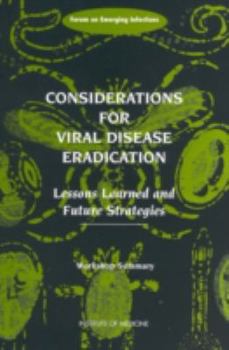Considerations for Viral Disease Eradication: Lessons Learned and Future Strategies: Workshop Summary
Since smallpox eradication, the science of eradication has changed and with it, our definitions of what diseases are possible to eradicate. However, eradication must not beget complacency. As has been learned from past control or eradication attempts with a variety of viral diseases, from yellow fever to influenza, accidental or intentional reintroduction is a real threat--one that could strike anywhere and for which we need to be fully prepared. The criteria for assessing eradicability of polio, measles, and other viral infections have been debated extensively. With the elimination and eradication of several viral diseases on the horizon, issues surrounding the cessation of immunization activities become exceedingly important. In an effort to better understand the dynamics of disease eradication and post--immunization policies, the Institute of Medicine Forum on Emerging Infections hosted a two-day workshop (February 1--2, 2001) on The Consequences of Viral Disease Eradication. This book explores the principles underlying the biological challenges, medical interventions, the continuing research agenda, and operational considerations for post--immunization strategies for vaccine--preventable viral diseases, and highlights important efforts that may facilitate wise decision making.
Format:Paperback
Language:English
ISBN:0309084148
ISBN13:9780309084147
Release Date:August 2002
Publisher:National Academies Press
Length:232 Pages
Weight:0.90 lbs.
Dimensions:0.6" x 6.1" x 9.0"
Customer Reviews
0 rating





